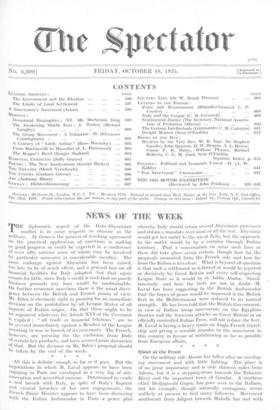• All this is definite enough so far as it
goes. But the negotiations in which M. Laval appears to have been engaging in Paris are enveloped in a very fog of mis- conception and unverified rumour. Determined to evade a real breach with Italy, in spite of Italy's flagrant and cynical breaches of her own engagements, the French Prime Minister appears to have been discussing :with the Italian Ambassador in Paris a peace plan whereby Italy should retain several Abyssinian provinces and obtain a mandate over most or all the rest. Abyssinia would get her outlet to the sea at Zeila, but the approtich to the outlet would be by a corridor through Italian territory. That a conversation on some such lines as these did take place seems certain, though how far the proposals emanated from the French side and how far from the Italian is less clear. What is beyond all question is that such a settlement as is hinted at would be rejected as decisively by Great Britain and every self-respecting League State as it would be at Addis Ababa. Simul- taneously—and here the facts are not in doubt—M. Laval has been suggesting to the British Ambassador that the hopes of peace would be Improved if the British fleet in the Mediterranean were reduced to its normal strength. He has been told that the British Government, in view of Italian troop movements on the Egyptian frontier and the ferocious attacks on Great Britain in an officially controlled Italian Press, will not reduce the fleet. M. Laval is laying a heavy strain on Anglo-French friend- ship and giving a sensible impulse to the movement in this country in favour of withdrawing as far as possible from European affairs. * *


























































